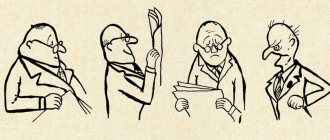Personality is a qualitative individual characteristic that combines stable and permanent mental properties that determine a person’s behavior and attitude. Literally, translated from Greek, character means a sign, a trait. Character in the structure of personality combines the totality of its various qualities and properties that leave an imprint on behavior, activity and individual manifestation. A set of essential, and most importantly, stable properties and qualities determine a person’s entire lifestyle and his ways of reacting in a given situation.
The character of an individual is formed, determined and formed throughout his entire life journey. The relationship between character and personality is manifested in activity and communication, thereby determining typical modes of behavior.
Personality Traits
Any trait is some stable and unchangeable stereotype of behavior.
Characteristic personality traits in a general sense can be divided into those that set the general direction for the development of character manifestations in the complex (leading), and those that are determined by the main directions (minor). Leading traits allow you to reflect the very essence of character and show its main important manifestations. We must understand that any character trait of a person will reflect the manifestation of his attitude to reality, but this does not mean that any of his attitudes will directly be a character trait. Depending on the individual’s living environment and certain conditions, only some manifestations of relationships will become defining character traits. Those. a person may react aggressively to a particular irritant of the internal or external environment, but this will not mean that the person is evil by nature.
In the character structure of each person, there are 4 groups. The first group includes traits that determine the basis of personality, its core. These include: honesty and insincerity, integrity and cowardice, courage and cowardice, and many others. The second includes traits that demonstrate an individual’s attitude directly towards other people. For example, respect and contempt, kindness and anger, and others. The third group is characterized by the individual’s attitude towards himself. It includes: pride, modesty, arrogance, vanity, self-criticism and others. The fourth group is the attitude towards work, activity or work performed. And it is characterized by such traits as hard work and laziness, responsibility and irresponsibility, activity and passivity, and others.
Some scientists additionally identify another group that characterizes a person’s attitude towards things, for example, neatness and sloppiness.
They also distinguish such typological properties of character traits as abnormal and normal. Normal traits are characteristic of people who have a healthy psyche, while abnormal traits include people with a variety of mental illnesses. It should be noted that similar personality traits can be considered both abnormal and normal. It all depends on the degree of expression or whether it is an accentuation of character. An example of this could be healthy suspicion, but when it goes off scale, it leads to paranoia.
The determining role in the formation of personality traits is played by society and a person’s attitude towards it. It is impossible to judge a person without seeing how he interacts with the team, without taking into account his attachments, dislikes, comradely or friendly relations in society.
An individual's attitude towards any type of activity is determined by his relationships with other persons. Interaction with other people can encourage a person to be active and rationalize, or keep him in tension and give rise to his lack of initiative. An individual's idea of himself is determined by his relationships with people and his attitude to activity. The basis in the formation of personality consciousness is the direct relationship to other individuals. A correct assessment of another person’s personality traits is a fundamental factor in the formation of self-esteem. Also, it should be noted that when a person’s activity changes, not only the methods, methods and subject of this activity change, but also the person’s attitude towards himself in the new role of an actor changes.
What is character type
Personality in psychology is the totality of the predominant personality traits in a particular person, the predominance of the type of thinking. Regarding character, they also talk about mentality, because they are interconnected. The mindset determines the human character. The following mindsets are distinguished:
- Analytical. A person’s interest in the exact sciences is explained by being guided by logic, not by feelings. Such people are often consistent in their actions, love planning, are attentive and rational.
- Humanitarian. A person of this type gravitates towards creativity, literature, art, and social sciences. People inclined towards the humanities are prone to empathy, love to experience emotions and do not hide it, and are concerned about social problems.
- Artistically - figurative. Creative people, their thoughts are often unstructured, they tend to turn information into visual images - this way it is easier for them to perceive. Representatives of this type are often dreamy, extraordinary and unpredictable.
- Practical. A mindset that combines analytical and humanitarian. Thus, the character of a person with a practical mindset also combines character traits inherent in both an analytical mindset and a humanitarian one.
Character is a set of predominant personality traits
Personality traits
The main feature of character in the personality structure is its certainty. But this does not mean dominance of one trait. Several traits, contradicting or not contradicting each other, can dominate a character. Character can lose its definition in the absence of clearly defined traits. The system of moral values and beliefs of an individual is also a leading and determining factor in the formation of character traits. They establish the long-term direction of individual behavior.
The character traits of an individual are inextricably linked with his stable and deep interests. The lack of integrity, self-sufficiency and independence of the individual is closely related to the instability and superficiality of the individual’s interests. And, conversely, a person’s integrity and purposefulness and perseverance directly depend on the content and depth of his interests. However, similarity of interests does not yet imply similarity of characteristic personality traits. For example, among scientists you can meet both cheerful and sad people, both good and evil.
To understand the characteristics of a person’s character, one should also pay attention to his affections and leisure time. This can reveal new facets and characteristics of character. It is also important to pay attention to the compliance of a person’s actions with his established goals, because an individual is characterized not only by actions, but also by how exactly he produces them. The direction of activity and the actions themselves form the dominant spiritual or material needs and interests of the individual. Therefore, character should be understood only as the unity of the image of actions and their direction. It is on the combination of personality traits and his properties that a person’s real achievements depend, and not on the presence of mental capabilities.
What to do if you don't like your character
If a person does not accept himself, then it is difficult to talk about any happiness or self-satisfaction. The best way to fix a problem is to fight it. If you don't like your character or some of its traits, follow these tips:
- Observe yourself, do a character analysis. Make a list of traits you want to change.
- Many character traits have antonyms, like good and evil, honest and deceitful. Try to find an antonym for the trait that you don’t like. He will become your ultimate goal.
- Try to remember a hero, an idol, just a famous person, whose character seems ideal to you, the qualities of a person. Imagine how they would behave in your place.
- Change your habits that interfere with or contribute to the manifestation of an unwanted trait. If, for example, this trait is laziness, force yourself to play sports and get up earlier. Create a daily plan for yourself and stick to it.
Your personality requires constant work on yourself
Temperament and personality
The relationship between character and personality is also determined by the individual’s temperament, abilities and other aspects. And the concepts of temperament and personality form its structure. Character is a set of qualitative properties of an individual that determine his actions, manifested in relation to other people, actions, and things. Whereas temperament is a set of mental properties of an individual that influence his behavioral reactions. The nervous system is responsible for the manifestation of temperament. Character is also inextricably linked with the individual’s psyche, but its traits develop throughout life under the influence of the external environment. And temperament is an innate parameter that cannot be changed, you can only restrain its negative manifestations.
The prerequisite for character is temperament. Temperament and character in the personality structure are closely interrelated with each other, but at the same time they are different from each other.
Temperament embodies mental differences between people. It varies in depth and strength of manifestations of emotions, activity of actions, impressionability and other individual, stable, dynamic characteristics of the psyche.
We can conclude that temperament is the innate foundation and basis on which the personality is formed as a member of society. Therefore, the most stable and permanent personality traits are temperament. It manifests itself equally in any activity, regardless of its focus or content. Remains unchanged in adulthood.
So, temperament is the personal characteristics of an individual, which determine the dynamism of his behavior and mental processes. Those. The concept of temperament characterizes the pace, intensity, duration of mental processes, external behavioral reaction (activity, slowness), but not conviction in views and interests. It also does not determine the value of an individual and does not determine its potential.
There are three important components of temperament that relate to the general mobility (activity) of a person, his emotionality and motor skills. In turn, each of the components has a rather complex structure and is distinguished by various forms of psychological manifestation.
The essence of activity lies in the individual’s desire for self-expression and transformation of the external component of reality. At the same time, the very direction, the quality of implementation of these trends is determined precisely by the characterological characteristics of the individual and not only. The degree of such activity can range from lethargy to the highest manifestation of mobility - constant rise.
The emotional component of a person’s temperament is a set of properties that characterize the characteristics of the course of various feelings and moods. This component is the most complex in its structure compared to the others. Its main characteristics are lability, impressionability and impulsiveness. Emotional lability is the speed with which one emotional state is replaced by another or ceases. Sensibility is understood as the subject’s susceptibility to emotional influences. Impulsivity is the speed with which emotion turns into the motivating reason and force of actions and deeds without first thinking them through and making a conscious decision to carry them out.
The character and temperament of a person are inextricably linked. The dominance of one type of temperament can help determine the character of subjects as a whole.
What to do if you don't like your partner's character
Think about what exactly you don’t like: the character as a whole or some specific trait. In the first case, the question arises as to whether you really want to continue the relationship with this partner. In the second case, it is worth talking about it directly and discussing with your partner how you can correct the current situation. If you do not understand or do not know how to cope with the current situation, offer your partner couples therapy with a psychologist. A psychologist will help you come to an understanding.
It is not at all necessary that partners match in character, because in a relationship common interests, principles, and moral principles are much more important.
Personality types
Today in the specific literature there are many criteria by which personality types are determined.
The typology proposed by E. Kretschmer is now the most popular. It consists of dividing people into three groups depending on their physique.
Picnic people are people who tend to be overweight or slightly overweight, short in stature, but with a large head, wide face and short neck. Their character type corresponds to cyclothymics. They are emotional, sociable, and easily adapt to a variety of conditions.
Athletic people are tall and broad-shouldered people, with well-developed muscles, a resilient skeleton and a powerful chest. They correspond to the ixothymic type of character. These people are powerful and quite practical, calm and unimpressive. Ixothymic people are restrained in their gestures and facial expressions and do not adapt well to changes.
Asthenic people are people who are prone to thinness, their muscles are poorly developed, their chest is flat, their arms and legs are long, and they have an elongated face. Corresponds to the schizothymic character type. Such people are very serious and prone to stubbornness, and have difficulty adapting to change. Characterized by isolation.
K.G. Jung developed a different typology. It is based on the predominant functions of the psyche (thinking, intuition). His classification divides subjects into introverts and extroverts depending on the dominance of the external or internal world.
An extrovert is characterized by directness and openness. Such a person is extremely sociable, active and has many friends, comrades and just acquaintances. Extroverts love to travel and get everything out of life. An extrovert often becomes the initiator of parties; in companies, he becomes their soul. In ordinary life, he focuses only on circumstances, and not on the subjective opinion of others.
An introvert, on the contrary, is characterized by isolation and turning inward. Such a person isolates himself from the environment and carefully analyzes all events. An introvert has a hard time making contact with people, so he has few friends and acquaintances. Introverts prefer solitude to noisy companies. These people have an increased degree of anxiety.
There is also a typology based on the relationship between character and temperament, which divides people into 4 psychotypes.
A choleric person is a rather impetuous, fast, passionate and at the same time unbalanced person. Such people are subject to sudden mood swings and emotional outbursts. Cholerics do not have a balance of nervous processes, so they quickly become exhausted, thoughtlessly wasting their strength.
Phlegmatic people are distinguished by equanimity, unhurriedness, stability of moods and aspirations. Outwardly, they practically do not show emotions and feelings. Such people are quite persistent and persistent in their work, while always remaining balanced and calm. The phlegmatic person compensates for his slowness in work with diligence.
A melancholic person is a very vulnerable person, prone to stable experiences of various events. A melancholic person reacts sharply to any external factors or manifestations. Such people are very impressionable.
A sanguine person is a mobile, active person with a lively character. He is subject to frequent changes of impressions and is characterized by rapid reactions to any events. We can easily relate to the failures or troubles that befell him. When a sanguine person is interested in his work, he will be quite productive.
Also, K. Leonhard identified 12 types, often found in people with neuroses, accentuated characters. And E. Fromm described three social types of characters.
How to find out a person's character?
The characteristics of a person are manifested in everything he does, how and what he says, how he reacts to certain events. If you understand what kind of character a person has, you will be able to understand him better. To find out the character of another person, sometimes it is enough just to observe him.
Character in communication
In communicating with people, you can understand character traits that will tell you how a person relates to others, work, himself, and life in general. For example, hobbies can tell about your mindset, activity, love of life, and passion. A broad outlook will allow you to judge curiosity and openness to new things. The manner of communication will tell you about the emotionality, seriousness, good manners and education of the interlocutor. If a person speaks loudly, confidently, and does not hold back his emotions, then in front of you is an open and courageous person, easy-going. If the speech is quiet, the gestures are restrained, then this person is most likely not confident in himself, a reserved, calm person. Don’t be afraid to communicate with people and observe them; this will help in further communication and interaction.
Through communication you can learn a lot about a person's character.
Character is in the details
Little things can tell a lot about a person's character. Pay attention to the following details:
- Reaction to humor, jokes. There are characters with whom people take jokes as a personal insult; such individuals, as a rule, have low self-esteem.
- Eating food. People who eat slowly are usually patient and cheerful. People with fast food intake are not patient and can be ambitious.
- Who are they talking about? People with low self-esteem, modest and closed personalities do not like to talk about themselves. When the number of “I”s in a conversation increases, such a person is self-confident, selfish, and prone to narcissism.
Ask mutual friends
When you have to communicate with a stranger, ask mutual friends about their impressions or opinions about him. This will help you establish interpersonal contact faster.
But do not forget that this opinion will be quite subjective; try not to label it in advance.
Stressful situations
In stressful situations, people show their emotional and volitional character traits. People with leadership qualities react quickly to such situations and quite easily find a solution to the problem.
About human character in conflicts
Svetlana Kovalenko
Psychologist, clinical psychologist
Ask a Question
The most indicative for determining the character of a person are conflict situations. In general, conflicts are a normal phenomenon for any relationship; what is important is how a person constructs a conversation, whether he is trying to get out of a conflict situation and how to treat you during a quarrel. In normal communication, you may not notice anger, aggression, neglect, selfishness, emotional immaturity and even abuse. But in conflicts it is impossible to hide this. If your partner puts pressure on you during a quarrel, devalues your words and aspirations, and this does not in any way correspond to the image that has formed in your head, it is worth thinking about the real traits of his character, and not about those that he tried to show you.
Psychology is a complex and subtle science, therefore, to get to know a person it takes years and going through various kinds of situations.
Character of a person by handwriting
When you have the opportunity to study a person's handwriting, be sure to take it. Handwriting can also tell a lot about a person's character.
- Sweeping handwriting means a person is generous, but prone to negligence and negligence.
- Captious people with complexes, thrifty or stingy people write in condensed handwriting.
- Illegible handwriting indicates that the person is nervous and energetic.
- Pale handwriting - this person loves loneliness, is not confident in himself, has complexes.
- Large handwriting shows that the person is kind and open, sociable, has emotional stability, and is interesting to communicate with.
- Small handwriting is characteristic of purposeful, reserved people.
Handwriting analysis is often used in investigations when it is necessary to create a description of a person’s personality and character
Psychological character of personality
Everyone has long known that significant changes occur in the psychological character of an individual in the process of its development and life activity. Such changes are subject to typical (natural) and atypical (individual) trends.
Typical trends include changes that occur in psychological character as a person grows older. This happens because the older an individual becomes, the faster he gets rid of childish manifestations in character, which distinguish childish behavior from adult behavior. Childhood personality traits include capriciousness, tearfulness, fears, and irresponsibility. Adult traits that come with age include tolerance, life experience, rationality, wisdom, prudence, etc.
As an individual moves along the path of life and gains life experience, changes occur in their views on events, and their attitudes towards them change. Which together also influences the final formation of character. Therefore, there are certain differences between people of different age groups.
For example, people between the ages of approximately 30 and 40 live mainly in the future; they live in ideas and plans. All their thoughts, their activities are aimed at realizing the future. And people who have reached 50 years of age have approached the point where their present life meets simultaneously with their past life and their future. And therefore, their character is modified in such a way as to correspond to the present. This is the age when people completely say goodbye to their dreams, but are not yet ready to be nostalgic for the years they have lived. People who have passed the 60-year mark practically no longer think about the future; they are much more concerned about the present, and they have memories of the past. Also, due to physical ailments, the previously taken pace and rhythm of life is no longer available to them. This leads to the appearance of such character traits as slowness, measuredness, and tranquility.
Atypical, specific tendencies are directly related to events experienced by a person, i.e. conditioned by past life.
As a rule, character traits that are similar to existing ones are consolidated much faster and appear much faster.
You should always remember that character is not an immutable quantity; it is formed throughout a person’s entire life cycle.
How a person's character is formed
A person’s character cannot be called stable; the process of formation occurs throughout a person’s life under the influence of various factors. Let's look at the factors influencing its formation.
At what age is character formed?
The Romans also called newborns tabula rasa - “blank card”. Is it so? It has been scientifically proven that character begins to form before the birth of a child - hormones entering the mother’s body begin to shape the character of an unborn person. That is why, during pregnancy, future parents are advised to communicate with the child, turn on music, and monitor the emotional state of the mother. Even during breastfeeding, the mother's hormones can pass through the milk to the baby.
Character begins to form in the womb
Parenting factors
Nevertheless, the main personal characteristics are formed at the age of 3–4 years, primarily under the influence of the family. Raising a child consists precisely in instilling in him the correct values, behavior, and moral rules. Taken together, education is one of the most important factors influencing the development of a still small, but already human.
Although many psychologists argue that in childhood the most important factor is not so much upbringing as personal example. Children identify themselves and try to imitate the adults around them, therefore the best and most effective way to raise a child is to raise oneself.
Genetic influence
As mentioned earlier, only the transmission of temperament is genetically possible. Temperament, in turn, influences the development of character, so temperament can be called a factor of genetic influence on the formation of character. Temperament determines the formation of certain human traits.
For example, sanguine and choleric people, due to their openness and extraversion, are distinguished by their sociability, sociability and activity. Phlegmatic people are the most stress-resistant, while melancholic people are more often shy and insecure.
External social influence
From 7 to 15 years of age, the influence of the social environment is the most important factor in the formation of character. In the process of personality formation, children take examples not only from their parents, but also, for example, from educators and teachers. Schools and other educational institutions (kindergartens, clubs, sections) have a great influence on the developing character. The child meets a large number of people with different views and beliefs, types of thinking, and level of upbringing. Public opinion influences the formation of habits, rules of behavior, and interests.
In addition, the media can also have a social influence on character. For example, seeing news reports about crimes and what punishment the criminals suffered, the child will understand that such behavior is unacceptable and should refrain from such actions. Unfortunately, there are situations when the result is exactly the opposite.
The process of socialization has a direct impact on the formation of personality
Social character of personality
Individuals of any society, despite their individual personal characteristics and differences, have common psychological manifestations and properties, and therefore act as ordinary representatives of a given society.
The social character of a person is a general way of adapting a person to the influence of society. It is created by religion, culture, education system and family upbringing. It should also be taken into account that even in a family, a child receives an upbringing that is approved in a given society and corresponds to the culture, which is considered normal, ordinary and natural.
According to E. Fromm, social character means the result of a person’s adaptation to a particular way of organizing society, to the culture in which he is brought up. He believes that none of the known developed societies in the world will allow the individual to fully realize himself. From this it turns out that the individual from birth is in conflict with society. Therefore, we can conclude that the social character of an individual is a kind of mechanism that allows an individual to exist freely and with impunity in any society.
The process of adaptation of an individual in society occurs with a distortion of the character of the individual himself and his personality, to the detriment of it. According to Fromm, social character is a kind of defense, an individual’s response to a situation that causes frustration in the social environment, which does not allow the individual to freely express himself and fully develop, placing him obviously within limits and limitations. In society, a person will not be able to fully develop the inclinations and capabilities inherent in him by nature. As Fromm believed, social character is instilled in the individual and has a stabilizing character. From the moment an individual begins to have a social character, he becomes completely safe for the society in which he lives. Fromm identified several options of this nature.
What to do if people around you don’t like your character
First of all, it is important to understand that a person cannot be liked by everyone without exception. If dissatisfaction with your character is completely justified, and the person is really dear to you, ask what personality traits in you do not suit him. Close people have no interest in telling lies. If you yourself realize that you need to get rid of a certain trait, and its manifestations interfere with your life, then try to work on yourself.
But think about whether you will lose your individuality. When you cannot get rid of an annoying trait on your own, consult a psychologist. It will help identify the reason why the negative trait manifests itself and help you choose appropriate ways to work on it.
How to love your character
What should you do to love yourself?
- Accept yourself for who you are.
- Remember that any disadvantages can be covered by advantages.
- Do not engage in self-flagellation or excessive self-criticism.
- Work on yourself. Develop personal qualities that you like.
- Praise yourself, but don't over-praise.
- If you can’t fall in love with your character on your own, contact a specialist. Together with him, you will select the right and appropriate technique, determine the vector of work on self-acceptance.
Capabilities
When understanding why different people under the same living conditions produce different results, we are often guided by the concept of “ability,” assuming that it is they that influence what a person achieves. We use the same term to find out why some people learn something faster than others, etc.
The concept of " ability " can be interpreted in different ways. Firstly, it is a set of mental processes and states, often called the properties of the soul. Secondly, this is a high level of development of general and special skills, abilities and knowledge that ensure the effective performance of various functions by a person. And thirdly, abilities are everything that cannot be reduced to knowledge, skills and abilities, but with the help of which their acquisition, use and consolidation can be explained.
A person has a huge number of different abilities that can be divided into several categories.
Elementary and complex abilities
- Elementary (simple) abilities
are abilities associated with the functions of the senses and simple movements (the ability to distinguish smells, sounds, colors). They are present in a person from birth and can be improved throughout life. - Complex abilities
are abilities in various activities associated with human culture. For example, musical (composing music), artistic (the ability to draw), mathematical (the ability to easily solve complex mathematical problems). Such abilities are called socially conditioned, because they are not innate.
General and special abilities
- General abilities
are abilities that all people have, but are developed in everyone to varying degrees (general motor, mental). They determine success and achievements in many activities (sports, learning, teaching). - Special abilities
are abilities that are not found in everyone and for which, in most cases, the presence of certain inclinations is required (artistic, visual, literary, acting, musical). Thanks to them, people achieve success in specific activities.
It should be noted that the presence of special abilities in a person can be harmoniously combined with the development of general ones, and vice versa.
Theoretical and practical
- Theoretical abilities
are abilities that determine an individual’s propensity for abstract logical thinking, as well as the ability to clearly set and successfully carry out theoretical tasks. - Practical abilities
are abilities that are manifested in the ability to set and perform practical tasks associated with specific actions in certain life situations.
Educational and creative
- Learning abilities
are abilities that determine the success of learning, assimilation of knowledge, skills and abilities. - Creative abilities
are abilities that determine a person’s ability to create objects of spiritual and material culture, as well as influencing the production of new ideas, making discoveries, etc.
Communicative and subject-activity
- Communication abilities
are abilities that include knowledge, skills and abilities related to communication and interaction with others, interpersonal assessment and perception, establishing contacts, networking, finding a common language, liking oneself and influencing people. - Subject-activity abilities
are abilities that determine the interaction of people with inanimate objects.
All types of abilities are complementary, and it is their combination that gives a person the opportunity to develop most fully and harmoniously. Abilities influence both each other and a person’s success in life, activity and communication.
In addition to the fact that psychology uses the concept of “ability” to characterize a person, terms such as “genius”, “talent”, “giftedness” are also used, indicating more subtle nuances of a person’s individuality.
- Giftedness
is the presence in a person from birth of the inclinations for better development of abilities. - Talent
is an ability that is developed to its fullest extent through the acquisition of skills and experience. - Genius
is an unusually high level of development of any abilities.
As we mentioned above, a person’s life outcome is very often related to his abilities and their application. And the results of the vast majority of people, unfortunately, leave much to be desired. Many people begin to search for solutions to their problems somewhere outside, when the right solution is always found within a person. You should just look inside yourself. If a person in his daily activities does not do what he has inclinations and predispositions for, then the effect from this will be, to put it mildly, unsatisfactory. One of the options to change things is to accurately determine your abilities.
If, for example, you have an innate ability to lead and manage people, and you work as a goods receiver in a warehouse, then, of course, this occupation will not bring any moral, emotional, or financial satisfaction, because you are doing something completely different from yours. business. In this situation, some kind of management position would be more suitable for you. You can start by at least working as a middle manager. Innate leadership abilities, when systematically used and developed, will take you to a completely different level. Set aside time in your schedule to determine your inclinations and abilities, study yourself, try to understand what you really want to do and what will bring you pleasure. Based on the results obtained, it will be possible to draw a conclusion on the direction in which to move further.
To determine abilities and inclinations, there are now a huge number of tests and techniques. You can read more about abilities here.
An aptitude test will appear here soon.
Along with abilities, as one of the main personality traits, temperament can be distinguished.
Emotions
Emotions can be characterized as special individual experiences that have a pleasant or unpleasant mental coloring and are associated with the satisfaction of vital needs.
Among the main types of emotions are:
Mood – it reflects the general state of a person at a certain moment
The simplest emotions are experiences that are associated with the satisfaction of organic needs
Affects are violent, short-lived emotions that are especially manifested externally (gestures, facial expressions)
Feelings are a spectrum of experiences associated with certain objects.
Passion is pronounced feelings that cannot (in most cases) be controlled.
Stress is a combination of emotions and the physical state of the body
Emotions, especially feelings, affects and passions, are an invariable part of a person’s personality. All people (personalities) are very different emotionally. For example, by emotional excitability, duration of emotional experiences, predominance of negative or positive emotions. But the main sign of difference is the intensity of the emotions experienced and their direction.
Emotions have the characteristic feature of having a serious impact on a person’s life. Under the influence of certain emotions at certain moments, a person can make decisions, say something, and perform actions. As a rule, emotions are a short-lived phenomenon. But what a person sometimes does under the influence of emotions does not always give good results. And because our lesson is devoted to how to improve your life, then we should talk specifically about ways to influence it favorably.
It is important to learn to control your emotions and not give in to them. First of all, you need to remember that an emotion, whatever it is (positive or negative) is just an emotion, and it will soon pass. Therefore, if in any negative situation you feel that negative emotions are beginning to prevail in you, remember this and restrain them - this will allow you not to do or say something that you may later regret. If, thanks to some outstanding positive events in life, you experience a surge of joyful emotions, then also remember this; this practice will allow you to avoid unnecessary energy costs.
Surely, you are familiar with the situation when, some time after a moment of intense joy or delight, you feel some kind of inner devastation. Emotions are always a waste of personal energy. It’s not for nothing that the ancient Jewish king Solomon had a ring on his finger with the inscription: “This too shall pass.” Always in moments of joy or sadness, he turned his ring and read this inscription to himself in order to remember the short duration of emotional experiences.
Knowing what emotions are and the ability to manage them are very important aspects in the development of personality and life in general. Learn to manage your emotions and you will know yourself fully. Such things as introspection and self-control, as well as various spiritual practices (meditation, yoga, etc.) allow you to master this skill. You can find information about them on the Internet. You can learn more about what emotions are in our acting training.
But, despite the importance of all the personality properties discussed above, perhaps the dominant role is occupied by another of its properties - motivation, since it influences the desire to learn more about oneself and immerse oneself in the psychology of personality, interest in something new, hitherto unknown, even if you are reading this lesson.










